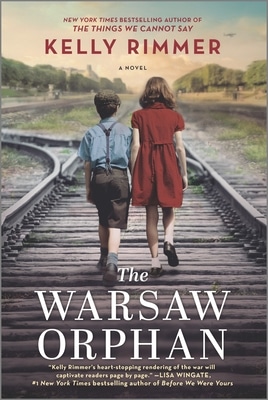The Warsaw Orphan by Kelly Rimmer is a story of love, tragedy, hope, and a fight for justice, from Nazi occupation to Soviet communist regime.
The Warsaw Orphan by Kelly Rimmer
It’s 1942 and Elzbieta Rabinek is a young girl with nowhere to do. The Nazis occupy Warsaw, Poland. Elzbieta is not allowed to go to school or go on many outings. Bored, she befriends her neighbor Sara and starts sneaking away to spend time with her new friend each day. But one night, Elzbieta stumbles upon Sara’s secret and she can’t look back.
You see, Sara may be a nurse but she has another mission – helping the Jews within the ghetto just steps from their home. Once Elzbieta realizes what is happening behind those walls, she cannot forget. She cannot return to hiding in her apartment. She must do something to help.
It is with Sara’s help that Elzbieta gains access to the ghetto where she helps Sara smuggle children out and to a safer place. On one of her visits to the ghetto, Elzbieta meets the Gorka family. Elzbieta becomes close with the eldest son, Roman. But Roman’s commitment to fight for justice, for Poland, puts himself and Elzbieta’s family at risk.
Review:
The Warsaw Orphan was a fantastic novel. I flew through it in a week and didn’t want to put it down. It was well-written, with a great plot, a few twists, and characters that drew you in and had you rooting for them.
That being said, with the current Russian war in Ukraine, The Warsaw Orphan struck a chord with me. It felt so bizarre to read about Nazi treatment of Jews and the horrible acts of both Nazi and Soviet soldiers, while watching the total destruction of Ukrainian cities and the many war crimes, in the name of “denazification.” I turn on the news and frankly am stunned on a daily basis. Russian President Putin sounds an awful lot like Hitler, prosecuting his “special military operation” in ways of the past. It’s hard to follow news and feel like it’s the year 2022, not the 1940s. This particular quote from The Warsaw Orphan resonated with me as so applicable to the current ongoing war:
As punishment for our decision to rebel, out homes, our libraries, our monuments and our infrastructure would be reduced to dust. It wasn’t enough that they had taken our people and our homes: they were going to take what was left of our culture. (p. 294)
Sounds like Russia today, right?
Even as I write this, this doesn’t resemble much of a review, but I won’t be changing what I’ve written. I highly recommend The Warsaw Orphan, but I think that it’s important to call out the similarities to today and the sense of deja vu that it brings. If you’ve turned on the news once in the past few weeks, the similarities are inescapable. Still, the book is fantastic and worth reading.
